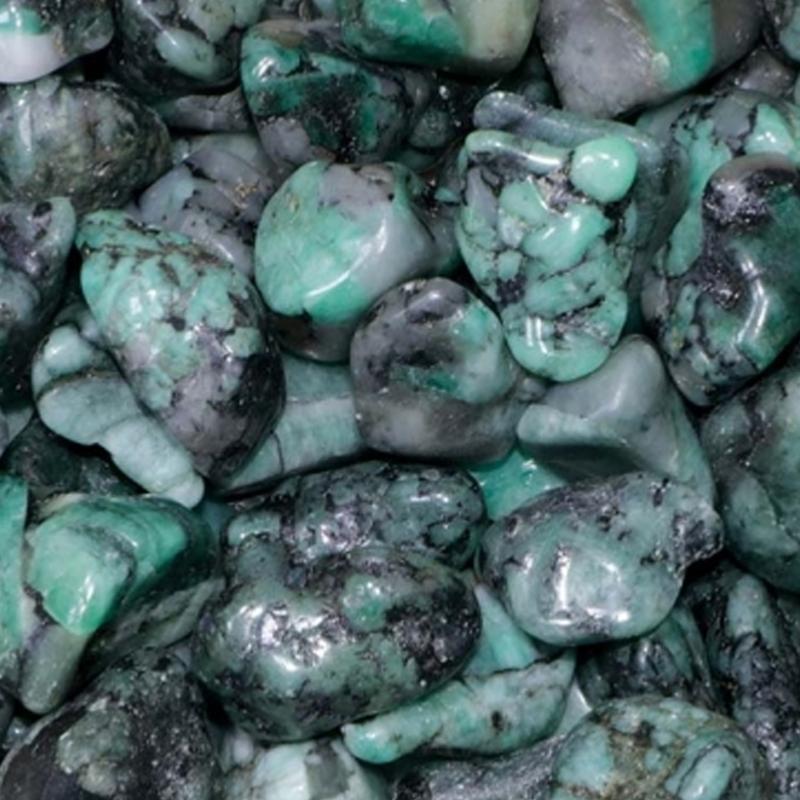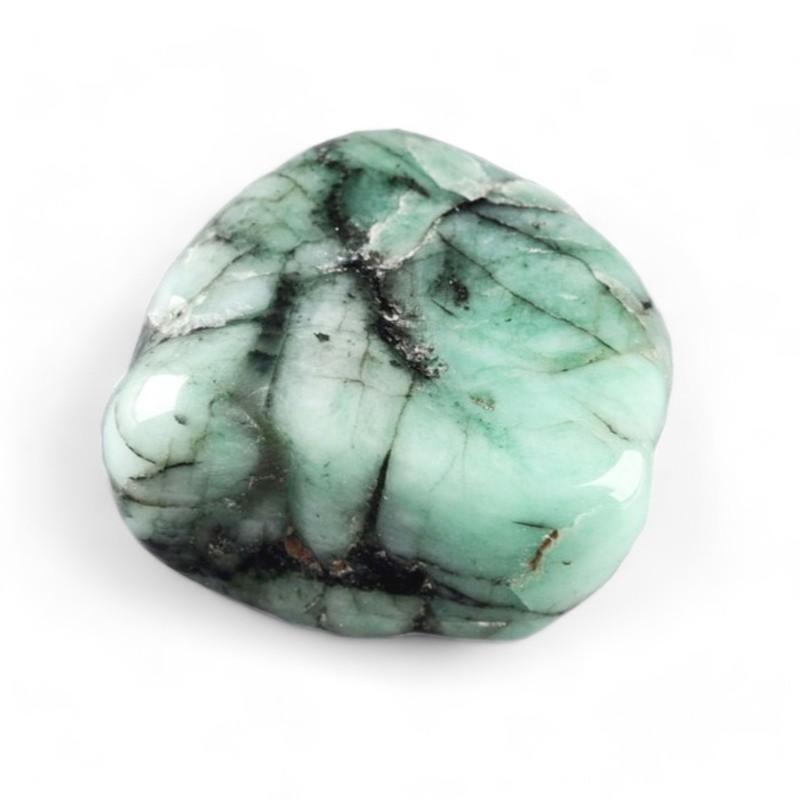Emerald Brazil AB (tumbled stone)
EMER-0205-10
- Regular price
-
3,90€ - Regular price
-
- Sale price
-
3,90€
Couldn't load pickup availability
Learn more
EMER-02
Origin: Brazil
Grade: AB
05-10g - About 15-25mm
10-20g - About 25-35mm
Origin:
Brazil
Grade:
AB = standard
Emerald tumbled stone from Brazil
Sold individually.
Weight of choice 05-10g and 10-20g
Colors and patterns vary from one stone to another.
The four precious stones, diamond, ruby, sapphire and emerald, are stones of exceptional beauty. The origin of the name of emerald comes from the Persian “zamarat”, then from the Latin “smaragdus”, translating as “green precious stone”. This magnificent stone belongs to the beryl family (from the ancient Greek “beryllos” meaning “crystal the color of sea water”). Its wonderful green color makes it a highly sought-after and coveted stone for millennia.
Extremely special conditions were required to allow the formation of the emerald, which justifies its rarity. Emerald is part of the silicate mineral group. It is essentially composed of beryllium, chromium, iron and vanadium. However, these components are not located in the same terrestrial layers. Beryllium comes from Earth's magma and the other components come from the Earth's mantle. The encounter is made by magma bubbles which rise up to the mantle. The content of these components is the origin of the multiple colors of green.
The most beautiful emeralds are those with total transparency, with a dark and intense green. Emerald remains sensitive to shocks, so it has been given a way of cutting it called “emerald cutting”. It thus makes it possible to limit accidents during crimping. Emeralds have named inclusions: gaps, frost or crystals, allowing them to certify their authenticity. They have a hardness of 7.5 to 8 on the Mohs scale. In conclusion, the beauty and rarity of an emerald depends above all on its color and transparency. The incredible green of emerald symbolizes the renewal of the seasons, fertility and life.
In ancient Egypt, around 5,000 BC, the Egyptians were already extracting emerald from mines not far from the Red Sea.
In 2000 BC, the Babylonians apparently used emeralds as currency.
Subsequently, these mines were exploited again by Greek miners during the time of Alexander the Great (356 to 323 BC). They were discovered in 1816 by Frédéric Cailliaud, explorer (1787 - 1869).
Cleopatra, queen of ancient Egypt (69 - 30 BC) was particularly fond of emeralds. They were the embodiment of national pride. Cleopatra owned sumptuous jewelry with emeralds and she used to give some with her portrait engraved on them. In 47 BC, Cleopatra acquired these mines and today, even though these mines were discovered 2,000 years before her birth, the Egyptian deposits are named Cleopatra's Emerald Mines.
The Celts and Romans also adored this fabulous stone, which they extracted from mines located in what is now Austria.
In his encyclopedia “Natural History”, Pliny the Elder (23 - 79 AD), writer and naturalist, states that Emperor Nero (37 - 68 AD) used emerald to improve his eyesight. He describes the emerald as such a powerful green that after looking at it, all other greens in nature seemed duller.
Emerald also appears in writings dating from the Middle Ages, such as the legend of the Knights of the Round Table. The Holy Grail, a chalice sought by knights, is said to be made of emeralds.
In the 16th century, emerald arrived in Europe via the Spanish Conquistadors. Indeed, they brought back exceptional specimens from Colombia, both in terms of their size and their color.
Since the 16th century, jewelry has still used emerald as a precious stone. Today, Colombia remains the main importer, supplying the finest pieces and producing 60% of the world's production.
The main deposits are located in Brazil, Russia, etc.
A stone of balance, emerald is also a stone of love and harmony. It relieves emotional disorders and soothes emotions. It allows you to release romantic feelings. It encourages unconditional love between two people. It can even reveal great romanticism.
It is also a stone of friendship, which develops qualities such as compassion, empathy and understanding. It encourages tolerance and wisdom. Thus, it can be the origin of quality relationships. It promotes loyalty and sincerity.
Emerald also facilitates parent/child relationships, restoring understanding and discernment. Dialogue is possible again during tensions and contributes to family reconciliation.
This stone engenders forgiveness, kindness and goodness. It avoids judging too quickly and develops the ability to listen. This allows you not to lose your temper too quickly in the event of a conflict. It provokes resilience and gives the possibility of freeing ourselves from the chains of the past.
Emerald stimulates memory, knowledge and learning. It makes you want to learn and understand. On the professional side, it improves group relationships thanks to the development of attention and a lot of open-mindedness.
Features
Color :
- Green
Astrological sign:
Stone Type:
- Rolled Stones
Age :
Gender :



Emerald Brazil AB (tumbled stone)
- Regular price
-
3,90€ - Regular price
-
- Sale price
-
3,90€
-
100% SECURE PAYMENT
Paypal, credit card, check, transfer
-
FREE DELIVERY
from 40€ purchase
-
SATISFIED OR REFUNDED
14 days to change your mind
-
CUSTOMER SERVICE AVAILABLE
contact@laboiteacailloux.com
to receive all our offers, good deals and new products from La Boite à Cailloux




